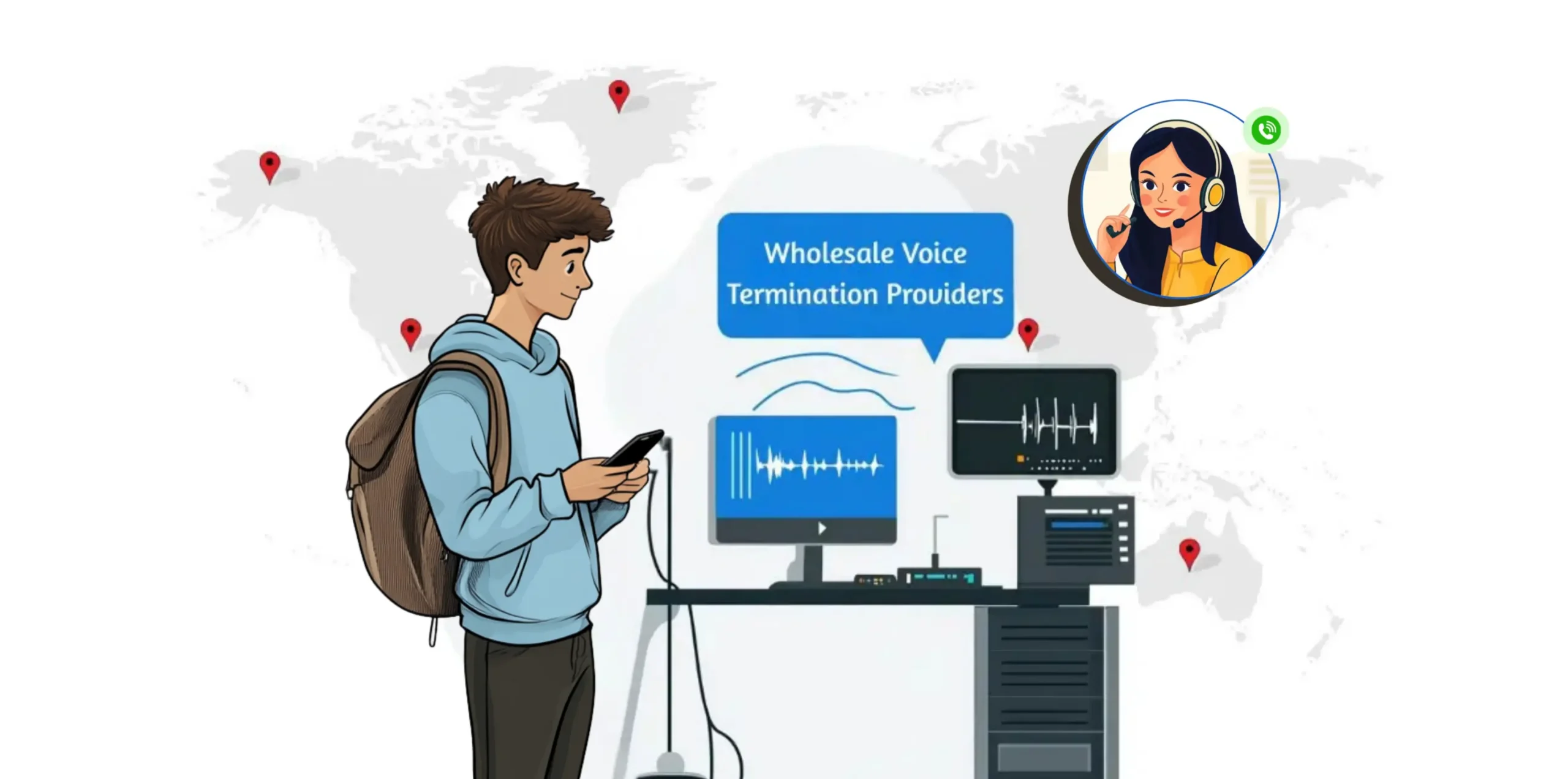Introduction
For telecommunication carriers, VoIP providers, and large enterprises, mastering the world of wholesale voice isn’t just a technical task, it’s a strategic key to growth, scalability, and profitability. However, the industry’s jargon, from CLI routes and SIP protocols to A-Z termination, can be a significant barrier.
This guide cuts through the complexity. We’ll demystify wholesale voice, exploring its core concepts, how it works, and most importantly, how to select the right partner to power your communications strategy. At My Country Mobile, we believe in simplicity and clarity, and our goal here is to equip you to make informed decisions that will effectively scale your business.
Wholesale Voice Fundamentals: Core Concepts and Primary Users
Wholesale voice is the bulk trading of call traffic between telecom providers, acting as the global telephone network’s B2B backbone. It allows carriers to route international calls by selling termination capacity to one another, seamlessly connecting calls worldwide.
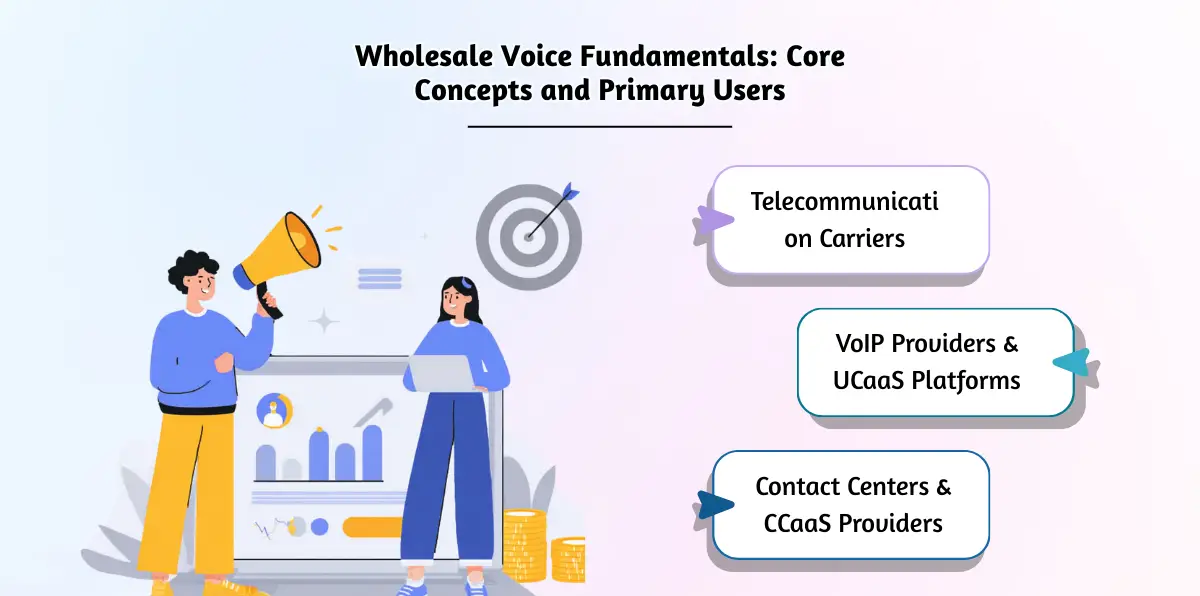
Who Uses Wholesale Voice Services?
The market for these services is vast, primarily serving businesses that handle high volumes of calls:
- Telecommunication Carriers: Mobile network operators (MNOs) and traditional landline providers use wholesale services to terminate calls outside their own networks.
- VoIP Providers & UCaaS Platforms: Companies offering cloud-based VoIP phone system rely on carrier-grade termination services to connect their internet-based calls to the traditional phone network (PSTN).
- Contact Centers & CCaaS Providers: High-volume call centers require cost-effective, reliable termination to handle thousands of concurrent calls globally.
- Large Enterprises: Multinational corporations use these services to manage their internal communications network across different countries, optimizing costs and ensuring quality.
A Technical Breakdown of Wholesale Voice Infrastructure
Understanding the core technology reveals the value of a great wholesale voice partner. The entire system is built on efficiency, redundancy, and intelligent routing to ensure a voice spoken in one part of the world is heard clearly in another.
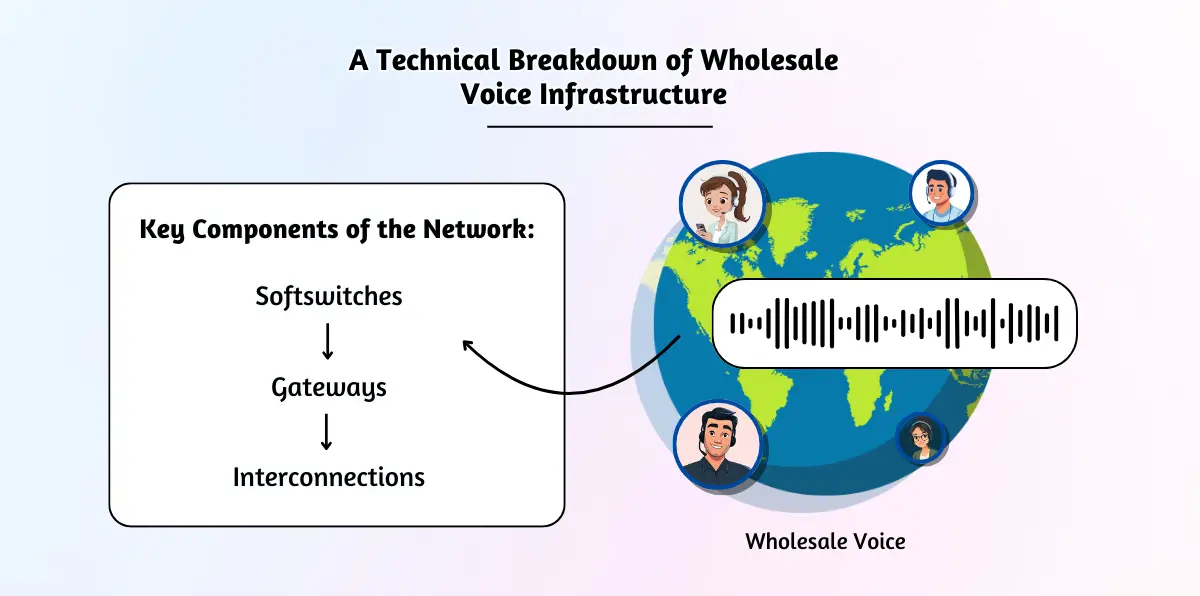
Key Components of the Network
- Softswitches: These are the software-based brains of the network, controlling call routing using protocols like SIP (Session Initiation Protocol). They analyze factors like cost, quality, and congestion to determine the most efficient VoIP routes for every single call.
- Gateways: These devices are the network’s universal translators. They convert voice traffic from one format to another (e.g., from a VoIP-based codec like G.729 to a traditional PSTN format like G.711) to ensure seamless interoperability between different networks.
- Interconnections: These are the physical or virtual links between carriers’ networks. A provider’s strength is often measured by the quality and quantity of its direct interconnections with Tier-1 carriers.
Rate Decks and Least Cost Routing (LCR)
A rate deck is a price list from a carrier detailing the per-minute cost to terminate a call to every country and network prefix. Sophisticated routing engines use this for Least Cost Routing (LCR), an algorithm that automatically selects the route for a call that offers the required quality at the lowest possible price, optimizing profitability.
The Importance of Network Reliability
In the world of voice, there’s no room for downtime. Every dropped call can mean a lost sale or a poor customer experience. A top-tier provider must invest heavily in redundant, geographically distributed networks. This includes multiple data centers and a 24/7 Network Operations Center (NOC) that proactively monitors the network to prevent service disruptions before they impact customers.
Decoding CLI vs. Non-CLI Routes
Perhaps the most critical decision when purchasing termination is choosing the right type of route. Not all routes are created equal, and the choice directly impacts both call quality and cost. The two primary categories are CLI and Non-CLI.
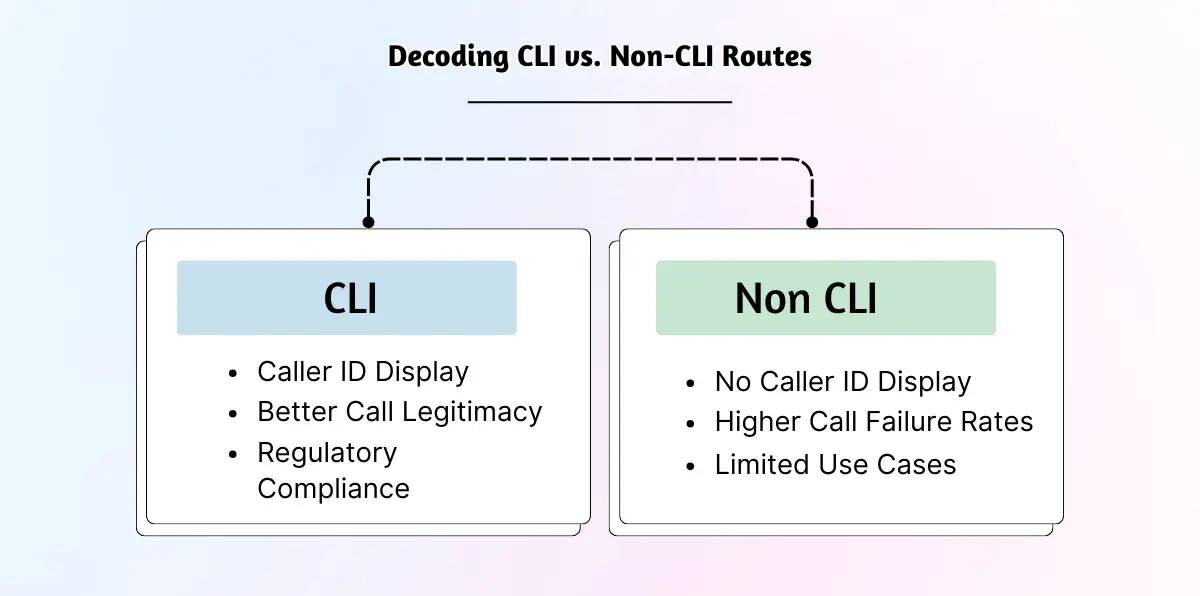
Premium CLI Routes: When Quality and Caller ID are Paramount
CLI stands for Caller Line Identification. A premium CLI route guarantees that the original caller’s phone number is correctly passed through and displayed on the recipient’s phone. These routes are typically the highest quality, often using direct interconnections with Tier-1 carriers. Because they are more reliable and transparent, they are also more expensive. They are essential for business-critical communications where trust and brand reputation are at stake.
Cost-Effective Non-CLI Routes: Strategic Use Cases for Price-Sensitive Traffic
Non-CLI routes do not guarantee that the original caller ID will be displayed; it may appear as “Unknown” or be replaced. These routes are often less direct, passing through multiple carriers to achieve the lowest possible cost. While the quality can be variable, they serve an important purpose for traffic that is highly price-sensitive and doesn’t require caller ID verification, such as high-volume marketing dialers or application-to-person (A2P) notifications.
My Country Mobile’s Approach: A Balanced Portfolio
Balance quality and cost without compromise. We provide a managed portfolio of Premium CLI and Non-CLI routes, enabling you to build a custom profile for your specific traffic mix.
Feature | Premium CLI (Caller Line Identification) Routes | Non-CLI (Non-Caller Line Identification) Routes |
Caller ID Display | Guaranteed to pass through the original caller’s number. | Caller ID may be blocked, altered, or displayed as “Unknown.” |
Call Quality | Highest quality, often using direct Tier-1 carrier routes. Crystal-clear audio. | Variable quality, often routed through multiple carriers for cost savings. |
Cost | Higher price per minute. | Significantly lower price per minute. |
Best For | Business communications, customer service calls, sales calls. | Call verification systems, marketing dialers, one-time passwords (OTPs). |
How to Select the Right Wholesale Voice Provider
Selecting a wholesale voice provider is a significant strategic decision. The right provider acts as a true partner invested in your success. The wrong one can lead to poor call quality, frustrated customers, and damaged credibility.

Look Beyond Price: Key Metrics to Evaluate
While cost is a factor, it should never be the only one. A cheap rate is worthless if calls don’t connect. Look for a provider that is transparent about its network performance:
- Network Uptime: This should be 99.99% or higher, backed by a Service Level Agreement (SLA).
- Call Completion Rate (CCR) : These metrics indicate the percentage of calls that are successfully connected. High ratios are a sign of a high-quality network.
- 24/7 NOC Support: A proactive, expert Network Operations Center is crucial for immediate issue resolution.
Evaluate Global Reach and Financial Transparency
A provider offering “A-Z termination” can terminate calls to virtually every country on the planet. This simplifies operations, as you only need one partner for global reach. Furthermore, a trustworthy provider offers clear billing practices. Understand their billing increments (e.g., 1/1 for per-second vs. 60/60 for per-minute) and how they communicate rate changes, as this directly impacts your profitability.
The Human Element: Why Expert Support is a Game-Changer
When network issues arise, the quality of support you receive defines your provider. You need access to expert engineers who can quickly diagnose and resolve complex routing issues. Through our experience at My Country Mobile, we’ve observed that a transparent, communicative partner with a dedicated account manager prevents most future issues by fostering a collaborative relationship. This personal touch is central to our philosophy.

The Future of Wholesale Voice: Key Trends
The wholesale voice industry is driven by technological trends prioritizing efficiency, security, and integration. Adapting to these shifts is now essential for long-term success.
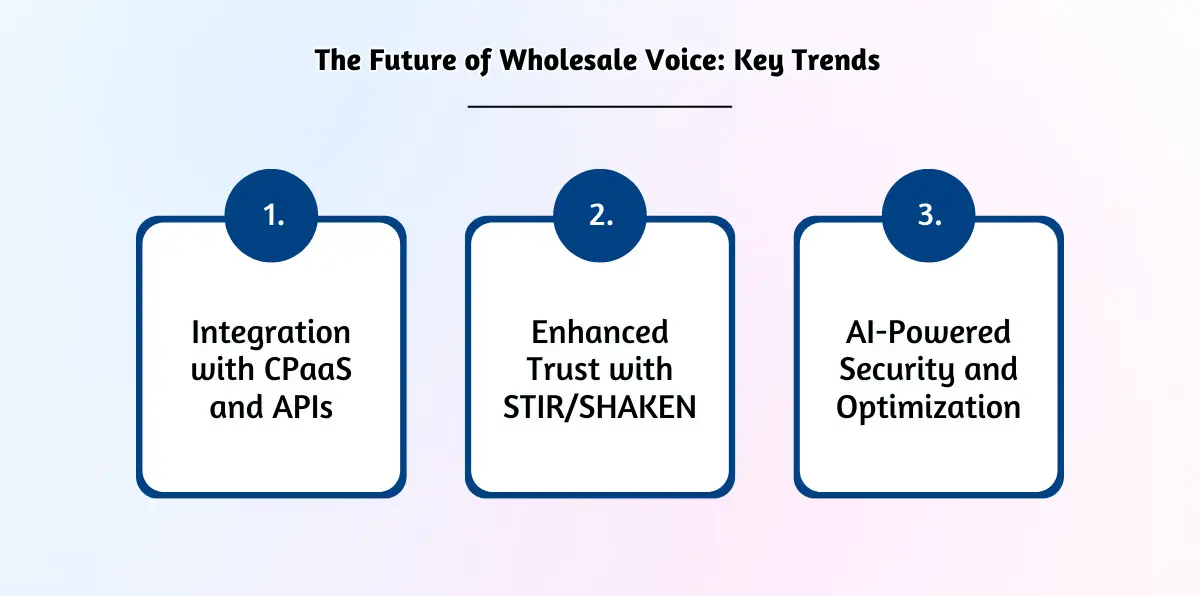
AI-Powered Security and Optimization:
Artificial Intelligence is transforming the landscape. It enables advanced, real-time fraud detection by analyzing call patterns to block scams like call pumping. It also powers predictive analytics for route optimization, automatically rerouting calls to avoid congestion and maintain superior quality.
Enhanced Trust with STIR/SHAKEN:
To combat illegal robocalling and spoofing, technologies like STIR/SHAKEN provide a framework for authenticating and verifying caller ID information. Working with a provider compliant with these standards is now critical for ensuring call deliverability, especially for traffic to the United States.
Integration with CPaaS and APIs:
Communication Platform as a Service (CPaaS) provides the essential APIs that allow developers to easily embed voice calling functions. This enables the seamless integration of real-time communication features directly into any application or software.
Why My Country Mobile is Your Ideal Wholesale Voice Partner
Navigating global communications requires more than technology; it requires a dedicated partner. We’ve built our wholesale voice service on reliability, simplicity, and a deep commitment to our partners’ success.
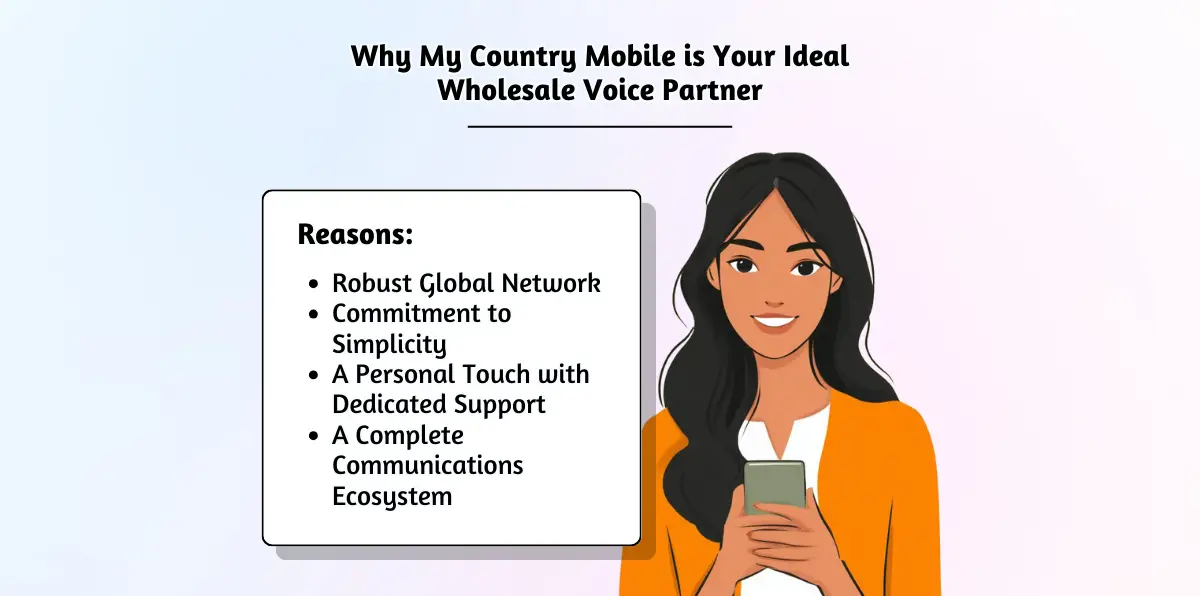
- Robust Global Network: We deliver exceptional call quality by processing billions of minutes annually across our world-class, geo-redundant infrastructure with strategic points of presence worldwide.
- Commitment to Simplicity: From our intuitive self-service platform to our clear and honest billing, we take the complexity out of managing global voice traffic.
- A Personal Touch with Dedicated Support: The support from My Country Mobile is night and day compared to our previous provider. Having a dedicated account manager who understands our traffic patterns has been a game-changer for optimizing our costs and resolving issues before they start.
- A Complete Communications Ecosystem: We can support your growth, whether you need raw voice termination, a full-fledged UCaaS platform, or powerful AI-driven communication tools.
Conclusion
Wholesale voice is the force connecting the world, one conversation at a time. Choosing the right provider is a strategic decision that impacts everything from call quality to your bottom line. By prioritizing a strong network, transparent practices, and a true partnership approach, you can build a communications strategy that is resilient, scalable, and ready for the future.
Put My Country Mobile’s network to the test with our risk-free trial. Discover the crystal-clear quality and reliability that drives business growth.
Frequently Asked Questions (FAQ's)
What exactly is wholesale voice in simple terms?
Think of it as the backbone of the world’s phone network where providers trade call traffic in bulk. This is what allows your calls to connect affordably and seamlessly to anywhere on the globe.
What’s the real difference between a CLI and a Non-CLI route?
A premium CLI route guarantees your real phone number shows up, which is vital for business calls where trust matters. Non-CLI routes are cheaper but may hide your number, making them suitable for automated alerts.
Besides price, what’s most important when choosing a provider?
Look for proof of a high-quality network, like excellent call completion rates (ASR) and guaranteed uptime. Just as important is having access to a 24/7 expert support team that can resolve issues fast.
I keep hearing about "A-Z termination." What does that mean?
It simply means a provider offers a complete global phone book for connecting your calls. They can terminate a call to nearly any country, from destinations starting with ‘A’ (like Afghanistan) to ‘Z’ (like Zimbabwe).
Is wholesale voice only for giant telecom companies?
Not at all! While major carriers are key users, it’s also essential for any business with high call volumes. This includes VoIP providers, contact centers, and large enterprises managing their own global communications.




